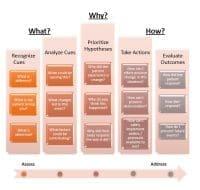Even though nurses are part of a caring profession, some of them bully new graduate nurses. About half (48%) of new graduate nurses fear they will be a target of bullying. Bullying and uncivil behaviors negatively affect the new graduate, the organization—and the patient. Here is how bullying affects new graduates and resources they can use to survive the experience.
Bullying burden
The American Nurses Association defines bullying as “repeated, unwanted, harmful actions intended to humiliate, offend and cause distress and includes hostile remarks, verbal attacks, taunts, threats, intimidation, and withholding support.”
New graduate nurses who are bullied experience both psychological and physical symptoms. Common emotions include an increase in anxiety, depression, and stress leading to emotional exhaustion. It’s already known that new graduate nurses have significant emotional exhaustion, with one study reporting 66% as having high levels.
Without their normal emotional equilibrium, new graduate nurses may feel less confident and question their clinical skills and abilities. They can feel undervalued, inadequate, and neglected. Feelings of moral distress may occur where they feel they aren’t able to provide the best care for their patients. Low job satisfaction may result with feelings that professional growth is limited. They may question whether they want to remain in the profession or not.
Maslow’s Hierarchy of Needs Model provides an explanation for the overwhelming emotional burden experienced by new graduate nurses who are bullied. Physiological needs are only partially met because of sleep problems and the impact of high levels of stress on the other basic needs. Safety needs are constantly challenged because new graduate nurses experience fear of bullying and actual bullying. When they experience bullying, it interferes with their ability to grow professionally and integrate into their new workplace. Thus, belongingness, Maslow’s third level of needs, is unable to be met.
Surviving bullying
Statistics reveal that new graduates probably will experience some level of bullying. If you’re a new graduate, you must have a plan to survive so you can maintain your self-esteem, achieve job satisfaction, and progress in your career.
First, learn about bullying behaviors. You may experience strong negative emotions and not know why unless you can recognize when you are bullied.
Second, assess the culture of the institution and your unit. Is there a policy about bullying? More importantly, is there a no tolerance policy with a chain of command if it occurs?
Third, make the most of your assigned preceptor. Ask questions, ask for feedback, and use feedback to make improvements in your practice. Watch for nurses who practice at an expert level and ask them to be mentors. Having a sounding board as you integrate into the institution will help manage your stress.
Fourth, access online resources such as the following:
- Assertive skills: https://www.skillsyouneed.com/ps/assertiveness.html
o Assertiveness encourages honest expression of thoughts, emotions, beliefs, and opinions and encourages others to use the same. Respect others and assert personal rights without undermining the rights of others. The “fogging” technique in assertiveness allows you to agree with truths within statements, not arguing, and not responding in an expected, argumentative way. When the air clears, a reasonable conversation can ensue.
- The Dauntless Nurse: http://www.e-bookdownload.net/search/the-dauntless-nurse
o This book provides communication techniques to assist in handling conversations. The “Control+Alt+Delete” technique helps you to respond to difficult situations by taking control and recognizing your internal dialogues, using alt and reframing your personal interpretation, pressing delete and creating a new response. The DESC communication model provides a framework for handling difficult situations: Describe the situation, Explore/express your thoughts, feelings, or concerns, State what you want to do differently, Consequence/Conclusion: state the positive consequence when someone does as you ask.
- Stop Bullying Now: http://stopbullyingnow.com/cognitive-interventions/
o Although this website targets bullying related to children and youth, it presents current research about reducing bullying and the resultant harm. It is a companion website for the Massachusetts Aggression Reduction Center and provides valuable resources and insights into bullying behavior. One resource is cognitive behavior rehearsal with practical suggestions on how to deal with bullying behaviors: focus on negative or critical feedback, focus on positive feedback, and help others see that people change and grow.
- Psychological Capital (PsyCap): https://positivepsychologyprogram.com/psychological-capital-psycap/
o This concept is based on appreciation and positive emotions to change the mindset and is linked to job and life satisfaction. High levels of PsyCap have been found to positively influence well-being and interpersonal relationships. The four components of hope, efficacy, resilience, and optimism are at the core of PsyCap; strategies and interventions are identified and described. The combination and relationship of these four components is stronger together than when considered individually. As one of these components develops, the other three improve as well.
- PACERS Civility Tool-kit: http://stopbullyingtoolkit.org/
o This toolkit provides guidelines to support nurse leaders to assess, recognize, identify, prevent, intervene, and eliminate bullying within their organization. The use of the four buckets of truth, wisdom, courage, and renewal assist in creating respect, civility, connectedness, acceptance, and support in the organization. To manage difficult discussions, the skill of Respectful Conversations provides structure to the conversation within a respectful setting. The five steps of the process are to plan the conversation, check the perception, deliver the message, empathize, summarize and follow-up.
- Workplace Bullying Institute: http://www.workplacebullying.org/
o This website is dedicated to ending workplace bullying and incorporates assistance for individuals, research, books, education, training, advocacy, and consultation. A link is provided to the Healthy Workplace Bill and Campaign website where the goal is to enact anti-bullying laws in each state.
- Crisis Prevention Institute De-Escalation Tips: https://www.crisisprevention.com/Blog/June-2011/De-escalation-Techniques
o This website provides ten tips to de-escalate a situation: be empathetic and nonjudgmental, respect personal space, use nonthreatening nonverbals, avoid overreacting, focus on feelings, ignore challenging questions, set limits, choose wisely what you insist upon, allow silence for reflection, and allow time for decisions. The training teaches you how to use your personal space, body language, and listening skills to minimize disruptive behaviors.
A personal commitment
Whether you’re a new graduate or an experienced nurse, it’s up to you to be a part of the change in the cycle of bullying. Be responsible for your behavior, promote respect and integrity in the workplace, and take the first step to end the bullying cycle. A personal commitment by all nurses to transform the nursing culture can lead the profession in change.
Joan M. Creed is a clinical assistant professor in the college of nursing at the University of South Carolina in Columbia, South Carolina. She thanks Joan M. Culley, PhD, MPH, MS, RN, CWOCN, FAAN, and JoAnne Herman, PhD, RN, for their assistance with preparing this article.
Selected references
Cavanaugh, S. Improving psychological health in the workplace. Canadian Nurse. 2012; 110(3):31-33.
Cherry K. The five levels of Maslow’s Hierarchy of Needs: How Maslow’s famous hierarchy explains human motivation. May 16, 2017. https://www.verywell.com/what-is-maslows-hierarchy-of-needs-4136760
Edmonson C, Allard J. Finding meaning in civility: Creating a “No Bullying Zone”. Clinical Scholars Review. 2013;6(2):131-137.
Gooch K. 5 thoughts and statistics on nurse bullying. February 24, 2016. https://www.beckershospitalreview.com/human-capital-and-risk/5-thoughts-and-statistics-on-nurse-bullying.html
Incivility, Bullying, and Workplace Violence Position Statement. July 22, 2015. http://nursingworld.org/MainMenuCategories/WorkplaceSafety/Healthy-Nurse/bullyingworkplaceviolence/Incivility-Bullying-and-Workplace-Violence.html
Wing T, Regan S, Laschinger H. The influence of empowerment and incivility in the mental health of new graduate nurses. J Nurs Manag. 2013;23(5):632-643.



















1 Comment.
Another helpful strategy for new nurses to manage bullying in health care is cognitive rehearsal, which was discussed in a previous article on American Nurse Today at https://www.myamericannurse.com/cognitive-rehearsal/